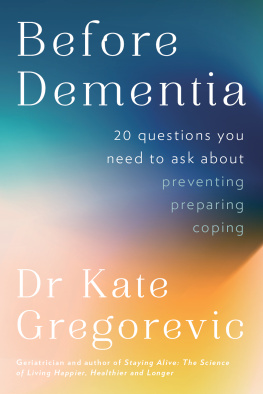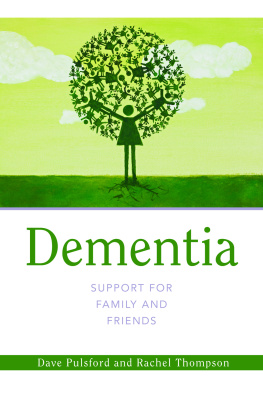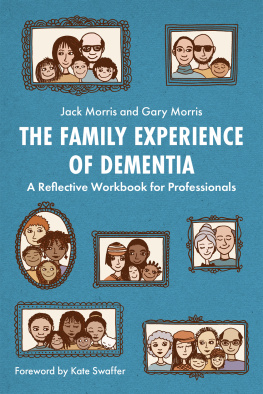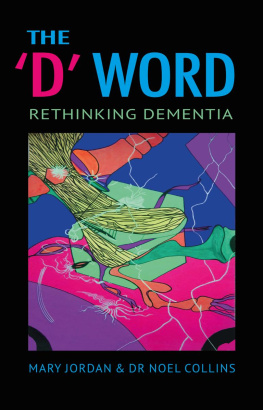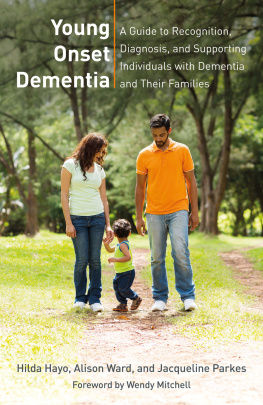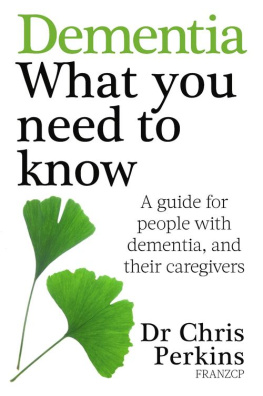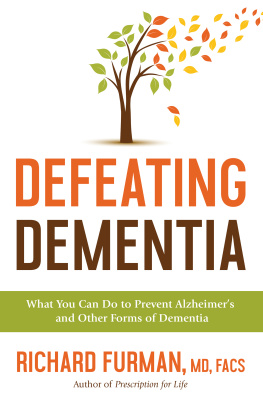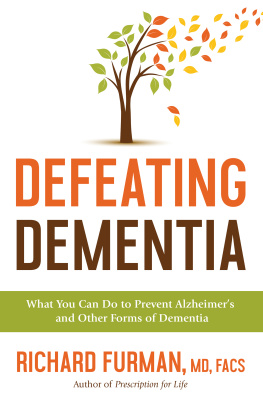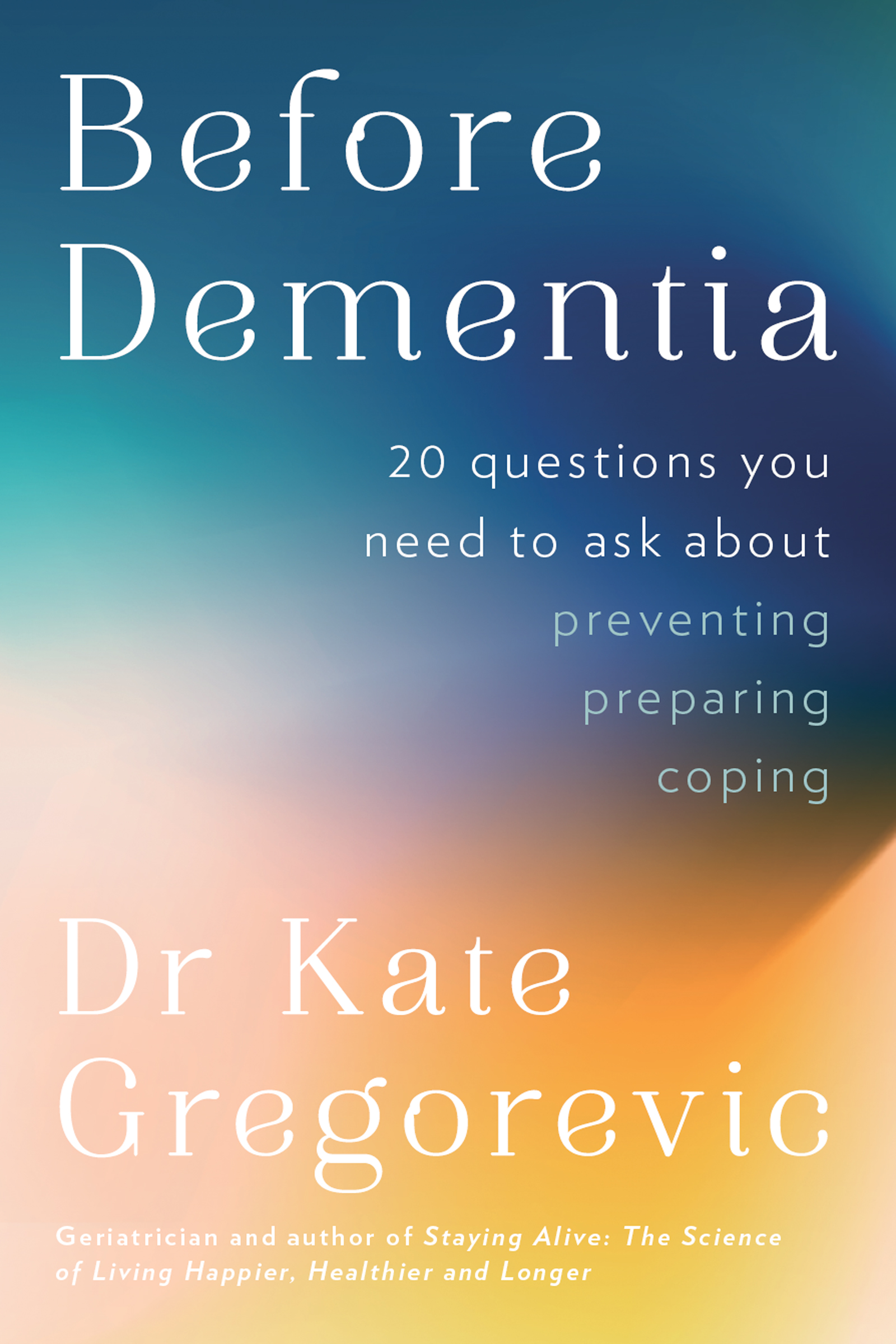Contents
Guide
For the people living with dementia
and for those who love them
This book was written on the unceded lands of the Wurundjeri people. The land always was and always will be Aboriginal land.
Contents
This is a book about dementia, and while there are elements of discovery and science, what it is really about is people. Its a book about living and of all the different things that happen to us from when we are born to when we get old. Its about the loss and grief that can accompany living with dementia. Its also about love and caring for others: the essence of humanity.
This book will have questions on biology and cells, questions on lifestyle and preventing dementia, and challenging questions about sex, death and autonomy. It will explore why disease is a social construct just as much as a biological construct and what this means to living with or caring for someone with dementia.
In these pages I am going to ask you to engage with challenging ideas and topics that we dont discuss in everyday life. It is possible to spend most of our days avoiding difficult thoughts and conversations it certainly feels comfortable to live this way but if we dont engage with difficult issues, we are missing an essential part of what it means to be human. As humans we can imagine a future for ourselves; we can have empathy for others. This ability to think beyond our immediate circumstances and connect is the best thing about us.
In writing this book, I also had to ask myself difficult questions. People with very advanced dementia, who have lost language ability, cannot consent to be part of a book to help understand the disease. Many cant speak in their own words about their experience. One of the reasons I wrote this book is to reduce stigma around dementia. I want people to recognise that even in its late stages, people living with dementia are still people trying to make sense of the world and to seek connection. Yet, I did not want to breach the privacy of my patients, so unless I had explicit permission from someone who could give consent, the stories shared with you are constructs to best demonstrate the breadth of human experience that I have encountered in the course of my work.
In my clinical work, I see many patients with advanced dementia. Some of these people are content, but many are distressed. I also speak to many carers who experience complex feelings. They love the person with dementia, they want to give them the best care possible, but they are also enduring grief and sometimes burnout. I dont want to worsen the fear of dementia, but I also want to respect the gamut of feelings of people who have shared their situations with me. Acknowledging the broad experience is part of improving care for people with dementia and supporting those who love and care for them.
This book might be uncomfortable reading at times, because it is uncomfortable to sit with ambiguity and uncertainty and to explore difficult topics and preconceived ideas, but I hope that in reading it, you will come away with an increased ability to understand some of the most complex aspects of being human. Facing our own mortality and uncertain future is confronting, but if we dont do this we miss the full richness of what it is to be alive.
A person living with dementia is not defined by their illness, but their illness is still a large part of their life. Part of breaking down stigma is considering the language we use. Using disrespectful language causes harm and can diminish the personhood of someone living with dementia. To that end, I have used the phrases person with dementia and person living with dementia. Language can be tricky to always get right, but the key guiding principle is to be respectful. The Dementia Australia language guidelines state, It is important to use language that focusses on the abilities (not deficits) of people living with dementia to help people stay positively and meaningfully engaged, and retain feelings of self-worth.
On a personal note, writing this book was an emotional process for me because I didnt realise how much work I needed to do in breaking down my own fears around dementia. It was also incredibly rewarding. The science of how our brains work, as well as what can go wrong, is deeply fascinating, especially in the context of the social and economic factors that influence biology. I spent time thinking about the broader issues of health and caring and have strengthened my resolve to end the stigma.
Most importantly, writing this book has improved my understanding and connection with the people I meet who are living with dementia. I hope that you find reading it just as interesting and rewarding.
Dr Kate Gregorevic
Its the end of my first consultation with Dulcie and her daughter Barbara. Dulcie has had dementia for many years. Barbara is struggling because Dulcie has been getting up multiple times a night, thinking it is morning and trying to go outside. Barbara wants to continue caring for her mother at home, but she is exhausted. She wants to know how to get help.
At the end of the appointment, I ask Barbara and Dulcie if they have any final questions. Barbara pauses a moment then asks, a little embarrassed, What is dementia?
Barbara was embarrassed to ask this question because she felt like she should already know the answer. One of the best things about little kids is they have no qualms about admitting a gap in their knowledge. For some reason, part of reaching adulthood is becoming self-conscious about not knowing something, a barrier that overrides curiosity. The problem with going through life embarrassed to admit to a gap in our knowledge is that it means missing opportunities to learn.
Barbara is a carer and lived-experience expert and so she understands that the question What is dementia? is actually very hard to answer.
Dementia occurs when a disease or progressive processes, cause damage and brain function is impaired enough to impact everyday life. The symptoms of dementia are the result of a brain that is no longer able to correctly take in information, interpret it and act on it. Dementia is a syndrome, or a collection of symptoms, and it can be caused by many different diseases. The onset of dementia is generally slow and gets worse over time. While there are common symptoms of dementia, it is nevertheless unique and individual to every person, because our social roles differ by age, gender, education, household, family structure and geography.
The word dementia is an umbrella term for multiple diseases that cause damage to the cells of the brain, stopping them being able to function and so leading to progressive decline in memory and thinking. These diseases often have overlap in symptoms, risk factors, and in the challenging questions they raise about autonomy and care. Unless otherwise specified, when I use the word dementia, I am talking about all the diseases that cause dementia.
It is also important to distinguish dementia from the disease process that is causing the damage in the brain. The damage in the brain can start decades before any symptoms of dementia. This means there isnt a clear day when someone goes from cognitively intact to having a cognitive disability. Its also important to keep in mind that not everyone with damage to the brain will have the same symptoms or indeed any symptoms at all.
Dementia is in the category of neurodegenerative disorders where there is progressive damage to the brain and nervous system by a disease process and, usually many years after diagnosis, it is fatal.

